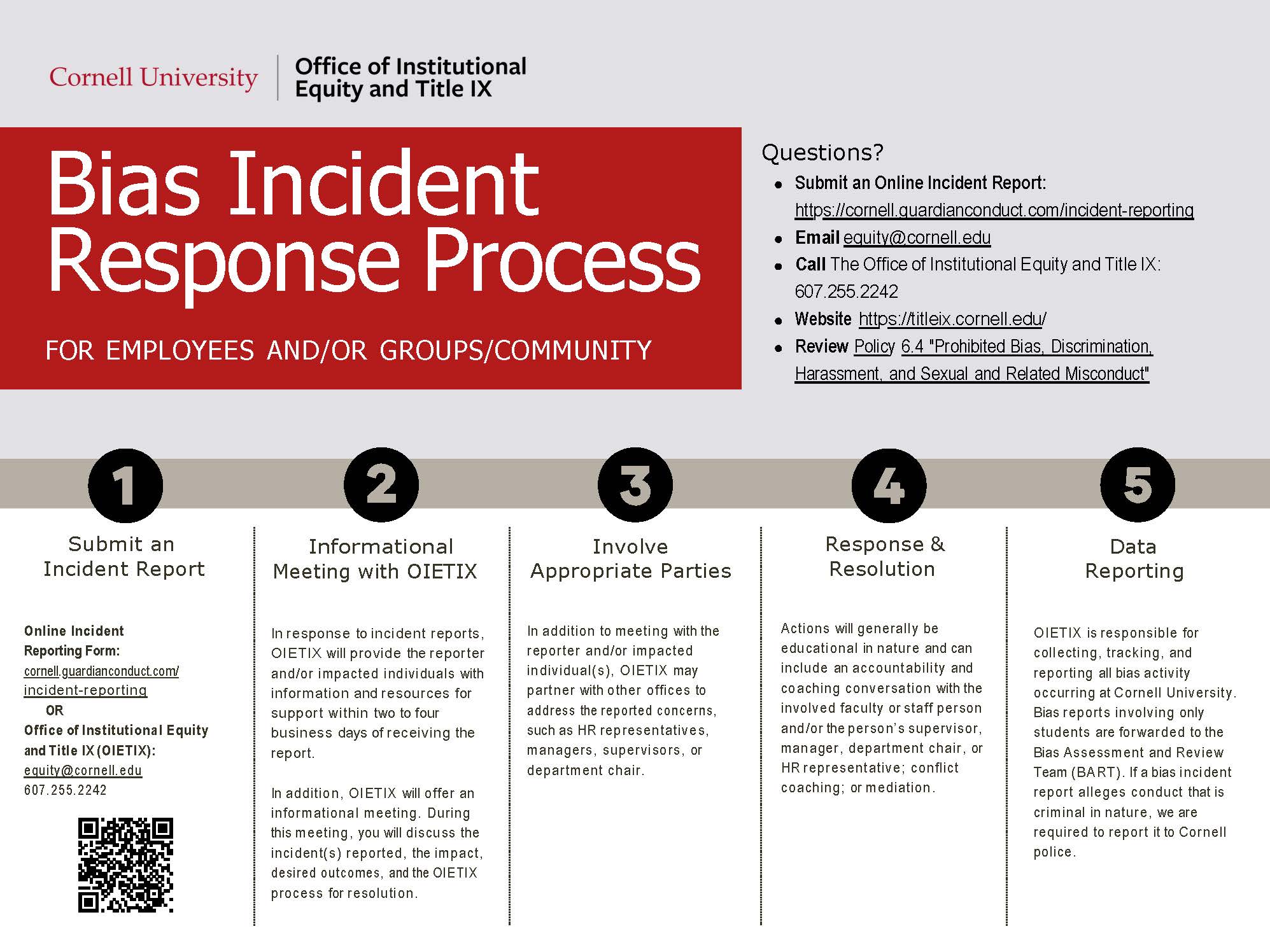For Faculty/Staff
A bias incident is action taken that one could reasonably and prudently conclude is motivated, in whole or in part, by the alleged offender’s bias against an actual or perceived aspect of diversity, including, but not limited to, age, ancestry or ethnicity, color, creed, disability, gender, gender identity or expression, height, immigration or citizenship status, marital status, national origin, race, religion, religious practice, sexual orientation, socioeconomic status, or weight.
A diverse community includes everyone and is the foundation for the meaningful exploration and exchange of ideas. Since its founding, Cornell University has encouraged a culture that provides for the full participation of all members of our campus community—this keeps us at the leading edge in education and in our fields and practices.
The University is committed to fostering a safe, respectful, and inclusive living, learning, and working environment for the entire University community. As community members, it is important to recognize our shared responsibility to each other, and to take steps to mitigate and prevent bias incidents and acts of hate or intolerance. The bias-related incident reporting system is one step toward promoting that we, as an institution, live out these values. The reporting system allows for you to safely and anonymously report an incident you may have experienced or witnessed, receive support, and explore options for resolution.
Throughout the academic year, the Office of Institutional Equity and Title IX (OIETIX) engages those involved in the bias reporting process—including the Bias Assessment and Review Team (BART) members and the constituent assemblies—to gather feedback, to propose structural and procedural changes to the Reporting Bias System, and to make recommendations on programs, policies, and ongoing educational interventions.
Examples of bias incidents include:
- defacement and vandalism
- use of oral or written racial epithets
- racially-themed parties
- ridiculing a person's language or accent
- insulting a person's traditional manner of dress
- hate messages and symbols
- language and imagery objectifying a person based on race or gender
- ridiculing a person's gender expression
- Supervisor makes derogatory comments
The examples listed above do not fully encompass the many ways in which bias-related incidents may occur.
NOTE: Advocacy of differing political viewpoints, expression of personal preferences, interpersonal disputes, and academic-based disputes generally do not constitute bias incidents.
Everyone.
Reporting bias and the resulting efforts to understand and prevent bias activity are a matter of taking part in a caring community. Anyone who directly witnesses or experiences bias activity on the Cornell campus or in an area that impacts the Cornell community should intervene in the moment as appropriate (e.g., contact Cornell Police at 911, if a crime is in progress, or interrupt the behavior in as much as the observer feels skilled and safe), and be sure to also report the incident as soon as possible.
To report an incident, individuals can use one of the following methods:
- By submitting an incident report online at https://cornell.guardianconduct.com/incident-reporting.
- By visiting the Bias Reporting at Cornell page
- By contacting the Cornell University Police Department (CUPD) at (607) 255-1111 or 911 for emergency assistance.
Yes, you have the option to report anonymously. However, you will also have the option to identify yourself if you would like to be contacted directly. Please note that in preserving your anonymity, we are limited in the conversations we can have and the actions we can take.
Information such as names of the individual parties involved are typically confidential. If a bias incident report alleges conduct that is criminal in nature, or is otherwise illegal or in violation of University policy, we are required to report it to Cornell police and/or the appropriate University official for review and action. One of our functions is to make recommendations on programs, policies, and ongoing educational interventions, and thus the general nature of reported incidents may be publicly discussed.
The Jeanne Clery Disclosure of Campus Security Policy and Campus Crime Statistics Act (Clery Act) requires universities to annually disclose crime statistics, including bias-related hate crimes. This information can be found in the Annual Security Report: https://www.cupolice.cornell.edu/campus-watch/annual-security-report/
A flow chart can be found in the image above.
For all reports containing contact information, a member of the OIETIX team will contact you to confirm the report was received and schedule a meeting to discuss your desired outcome and explain the actions that will be taken to address the issues raised in your report. Actions will generally be educational in nature and can include an accountability and coaching conversation with the involved faculty or staff person and/or the person’s supervisor, manager, department chair or HR representative; conflict coaching; or mediation.
If you choose to remain anonymous, the incident will be documented and used to consider future community education and programming. The accused may be contacted depending on the nature and extent of information provided in the report.
All reported incidents are included in the Annual Report on bias activity. The reports will be presented as aggregated de-identified data.
Actions will generally be educational in nature and can include an accountability and coaching conversation with the involved faculty or staff person and/or the person’s supervisor, manager, department chair or HR representative; conflict coaching; or mediation.
Please review Cornell Policy 6.4 - Prohibited Bias, Discrimination, Harassment, and Sexual and Related Misconduct for more information.
Unlawful discrimination refers to specific conduct prohibited by law that unfairly treats people differently because of their characteristic or perceived characteristics that the law deems to be unrelated to merit. An example of unlawful discrimination would be to deny membership into a group because a person is Muslim.
Bias is a preconceived negative opinion or attitude about a group of people who possess common physical characteristic or cultural experiences. An example of a bias incident, would be writing racist or homophobic graffiti on the door.
Unlawful discrimination often results from bias. Bias-related incidents, however, do not always result in unfair treatment that violates nondiscrimination laws.
